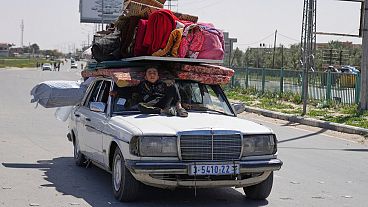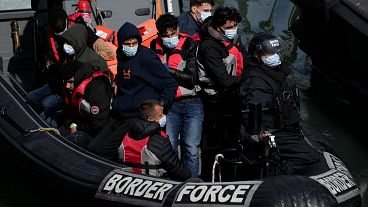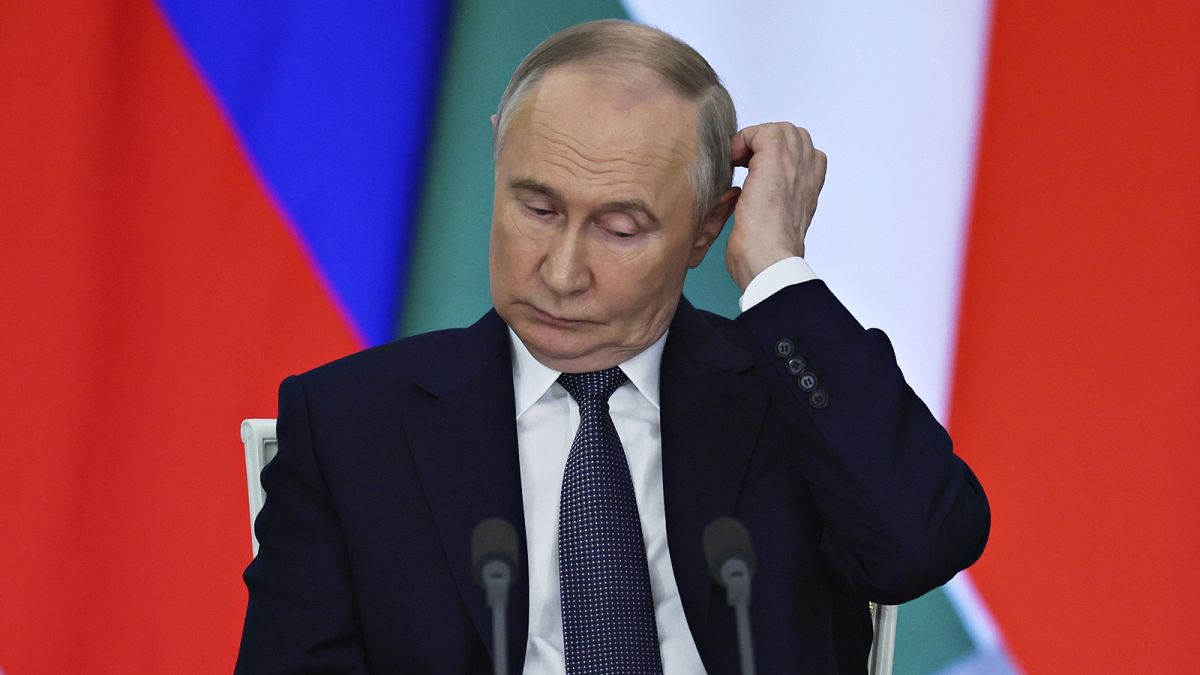The "unconditional withdrawal" of Russian forces from the territory of Ukraine is a key precondition to amend or lift sanctions, the European Commission has said in reply to the Kremlin's demand.
The European Union has emphatically rebuffed the Kremlin's demand that the Russian Agricultural Bank, known as Rosselkhozbank, and other financial entities involved in the agrifood trade be re-connected to SWIFT as a pre-condition to halt attacks in the Black Sea and ensure safe navigation, arguing the continued invasion of Ukraine makes it impossible to grant sanctions relief, be it broad or targeted.
The surprising demand was made public earlier this week after technical talks between Russia and the United States in Saudi Arabia meant to introduce a partial ceasefire in Ukraine, which has still not entered into force.
"The end of Russia's unprovoked and unjustified aggression in Ukraine and the unconditional withdrawal of all Russian military forces from the entire territory of Ukraine will be one of the main pre-conditions to amend or lift sanctions," a spokesperson for the European Commission said on Thursday.
"Russia must demonstrate genuine political will to end its illegal and unprovoked war of aggression," the spokesperson added. "Any peace deal or any discussion on this must lead to a just and long-lasting peace in Ukraine."
The EU's current goal is to maximise, rather than alleviate, pressure on Russia, the official explained, noting: "That's why we're using all the tools at our disposal."
SWIFT is a high-security system that allows rapid and accurate money transfers, connecting over 11,000 institutions across more than 200 countries. Based in La Hulpe, Belgium, the system falls under EU jurisdiction and is therefore subject to EU sanctions.
A string of Russian banks, including Rosselkhozbank, were expelled from SWIFT during the first year of the invasion to curtail Moscow's ability to finance its war machine.
Although Russia operates an alternative financial system, called SPFS, the exclusion from SWIFT has been a sore point for the country as it has created significant obstacles in the payments between Russia's agri-food firms and their clients worldwide.
Rosselkhozbank's desired return to SWIFT was only included in the Kremlin's read-out, which had five paragraphs detailing pre-conditions to restart the Black Sea Initiative.
The White House's version simply spoke about helping "restore Russia's access to the world market for agricultural and fertilizer exports, lower maritime insurance costs, and enhance access to ports and payment systems for such transactions."
The last part – "payment systems for such transactions" – appeared to refer to SWIFT, even if the US lacks authority over the system.
In an interview with Fox News, US Treasury Secretary Scott Bessent said "everything's on the table" but noted Moscow's pre-conditions were "premature".
"It will be determined by Russian leadership's next moves whether the sanctions go up or down and President Trump, I think, will not hesitate to raise the sanctions if it gives him a negotiating advantage," Bessent said.
"There will be a long discussion about many things in terms of the proper way to bring Russia back into the international system but I think this is premature, to discuss the terms of a deal before we have a deal," he added.
Speaking in Jamaica, US Secretary of State Marco Rubio said the Russian demand for targeted relief and the EU's role in the process would be examined.
"We're going to evaluate that. Some of those conditions include sanctions that are not ours. They belong to the European Union," Rubio said, warning that striking a peace deal would not be "simple" and take "some time".
'A strategic mistake'
The remarks from US officials stand in stark contrast with those from their EU counterparts. The appetite for sanctions relief runs very low across the bloc, as Russian strikes continue to wreak havoc across Ukraine and kill civilians.
The sanctions regime has been built across a record-breaking 16 packages. Undoing such a complex structure with the stroke of a pen will not be done lightly in Brussels.
"We often hear spin from Russia that our sanctions and our other steps aren't having any impact on their economy. Strange then that they're trying to get us to roll back on them," another Commission spokesperson said on Thursday.
After a meeting of the coalition of the willing in Paris, French President Emmanuel Macron categorically ruled out any sanctions relief "We unanimously agreed that now is not the time for lifting sanctions in any way. There can be no lifting of sanctions before peace has been established," Macron said on Thursday.
German Chancellor Olaf Scholz said it would make "no sense at all" to take that step before the war ends. "Unfortunately, we are still a long way from that," Scholz said.
President Volodymyr Zelenskyy, who attended the meeting, urged his Western allies to ignore Vladimir Putin's request and instead tighten the screws on the Russian economy.
"No lifting of any kind of sanctions until Russia will stop this war. And I think more pressure (is) needed, more packages of sanctions," Zelenskyy said.
An EU official echoed the call, warning it would be "a strategic mistake to give in to the temptation of an early softening of sanctions."
But the staunch position belies internal fragility.
Under EU rules, sanctions need to be renewed every six months by unanimity, meaning a single member state can derail the delicate process. Since Trump's inauguration, Hungary, a long-time critic of the measures, has twice threatened to block the rollover.
If Washington eventually agrees with the SWIFT demand, Hungary could put its foot down and force the other member states to partially grant sanctions relief as a condition to prolong the measures after the next deadline on 31 July.
Alternatively, the US could send signals that Russian transactions in dollars done through the system would not face legal consequences. However, the full reconnection to SWIFT will depend exclusively on EU approval, giving the bloc leverage in the negotiations.
"SWIFT cannot act in violation of EU laws. The US can modify its laws and regulations but cannot automatically reinstate Russian entities on SWIFT," Alessandro Rebucci, a professor of economics at the Johns Hopkins Carey Business School, told Euronews.
"We are now seeing the limit of US bullying powers. Bullying is not how the US has controlled the world order through Jan 19, 2025," he added, referring to the day before Trump's inauguration. "It is through self-interested cooperation with allies, negotiations with adversaries, and credible threats to use its immense but ultimately limited powers."













